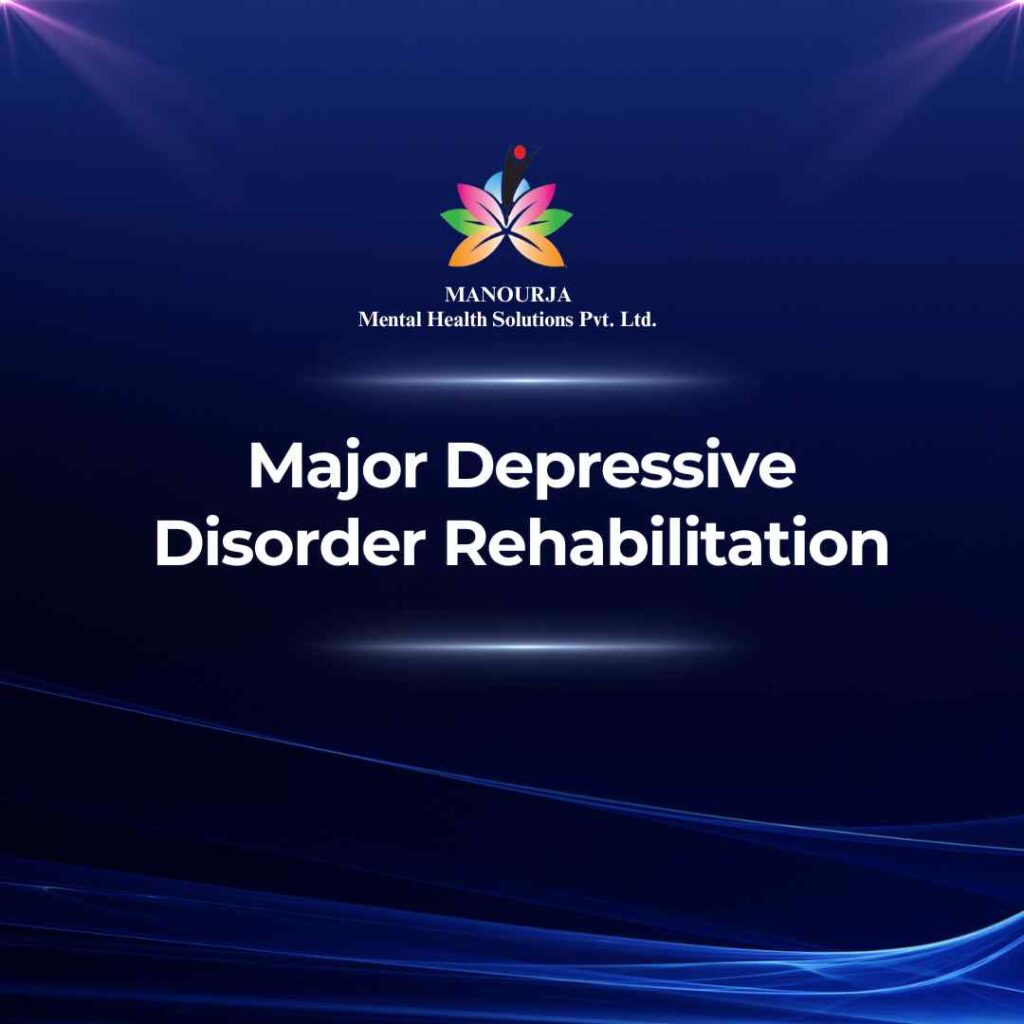Rehabilitation Major Depressive Disorder

Major Depressive Disorder (MDD) is a common but serious mood disorder that affects how a person feels, thinks, and handles daily activities. Recognizing the signs and symptoms of MDD is crucial for family members and individuals to seek appropriate treatment, whether through outpatient (OPD) or inpatient (IPD) psychosocial rehabilitation.
Signs and Symptoms of Major Depressive Disorder
Key indicators of Major Depressive Disorder include:
- Persistent Sadness or Low Mood: Feelings of emptiness or tearfulness that don’t go away.
- Loss of Interest or Pleasure: Noticeable lack of interest in almost all activities once enjoyed.
- Changes in Appetite: Significant weight loss or gain unrelated to dieting.
- Sleep Disturbances: Insomnia or sleeping too much.
- Fatigue or Loss of Energy: Feeling sluggish or physically drained almost every day.
- Feelings of Worthlessness or Excessive Guilt: Harsh self-criticism or feelings of guilt about things one cannot control.
- Difficulty Concentrating: Trouble thinking, focusing, or making decisions.
- Suicidal Thoughts or Behaviors: Thoughts of death or suicide, or suicide attempts.
Indicators for OPD vs. IPD Psychosocial Rehabilitation
Outpatient (OPD) Psychosocial Rehabilitation
- Suitable for individuals with mild to moderate symptoms who are still able to function relatively well in their daily lives.
- Effective for those who have a strong support system at home that can provide emotional support and motivation.
- Appropriate when the individual can maintain safety and has no immediate risk of harm to self or others.
Inpatient (IPD) Psychosocial Rehabilitation
- Necessary for individuals with severe symptoms that significantly impair their ability to function or when there is a risk of harm to themselves or others.
- Required if there are suicidal thoughts or behaviors, or if outpatient treatment has not been effective.
- Recommended when the individual needs a structured environment and intensive care to manage their symptoms.
Factors Influencing the Decision
- Severity of Symptoms: The intensity and impact of symptoms on daily functioning.
- Risk of Harm: Potential for self-harm/suicide.
- Support System: Availability and effectiveness of familial or social support.
- Response to Previous Treatments: Effectiveness of prior outpatient care or other interventions.
Role of Psycho-social Rehabilitation in Treating MDD
Psycho-social rehabilitation aims to restore individuals’ functional skills, enhance their coping strategies, and improve their quality of life through:
- Individual Therapy: Cognitive-behavioral therapy (CBT) or other modalities to address negative thinking and behavior patterns.
- Group Therapy: Provides social support and helps develop communication skills and social interaction.
- Skill Development: Training in life skills to increase independence and self-efficacy.
- Family Therapy: Involves family members in the treatment process to improve understanding and support.
Techniques and Approaches Used at MANOURJA
At MANOURJA, a variety of evidence-based methods are utilized for MDD:
- Cognitive Behavioral Therapy (CBT): Helps patients identify and change negative thought patterns and behaviors influencing depression.
- Interpersonal Therapy (IPT): Focuses on improving interpersonal relationships and communication patterns.
- Mindfulness-Based Cognitive Therapy (MBCT): Combines mindfulness techniques like meditation and breathing exercises with cognitive therapy.
- Pharmacotherapy: Medication may be used in conjunction with psychotherapy to manage symptoms effectively.
Steps in the Rehabilitation Process at MANOURJA
- Comprehensive Assessment: Detailed evaluation to diagnose MDD and assess its severity.
- Development of a Personalized Treatment Plan: Tailoring interventions to meet the specific needs of the individual.
- Implementation of the Treatment Plan: Engaging the patient in scheduled therapy sessions, educational workshops, and other therapeutic activities.
- Monitoring and Adjustment: Regular review of progress and adjustment of the treatment plan as needed.
- Aftercare Planning: Establishing ongoing support and preventive measures to maintain improvements and manage relapse.
Through comprehensive psychosocial rehabilitation, individuals with Major Depressive Disorder can significantly improve their emotional, psychological, and social functioning, leading to a restored and more fulfilling life. The structured and supportive approach at MANOURJA ensures that patients receive the care they need to navigate their journey toward recovery effectively.
“Every day is a new beginning; embrace it with hope and courage.”
